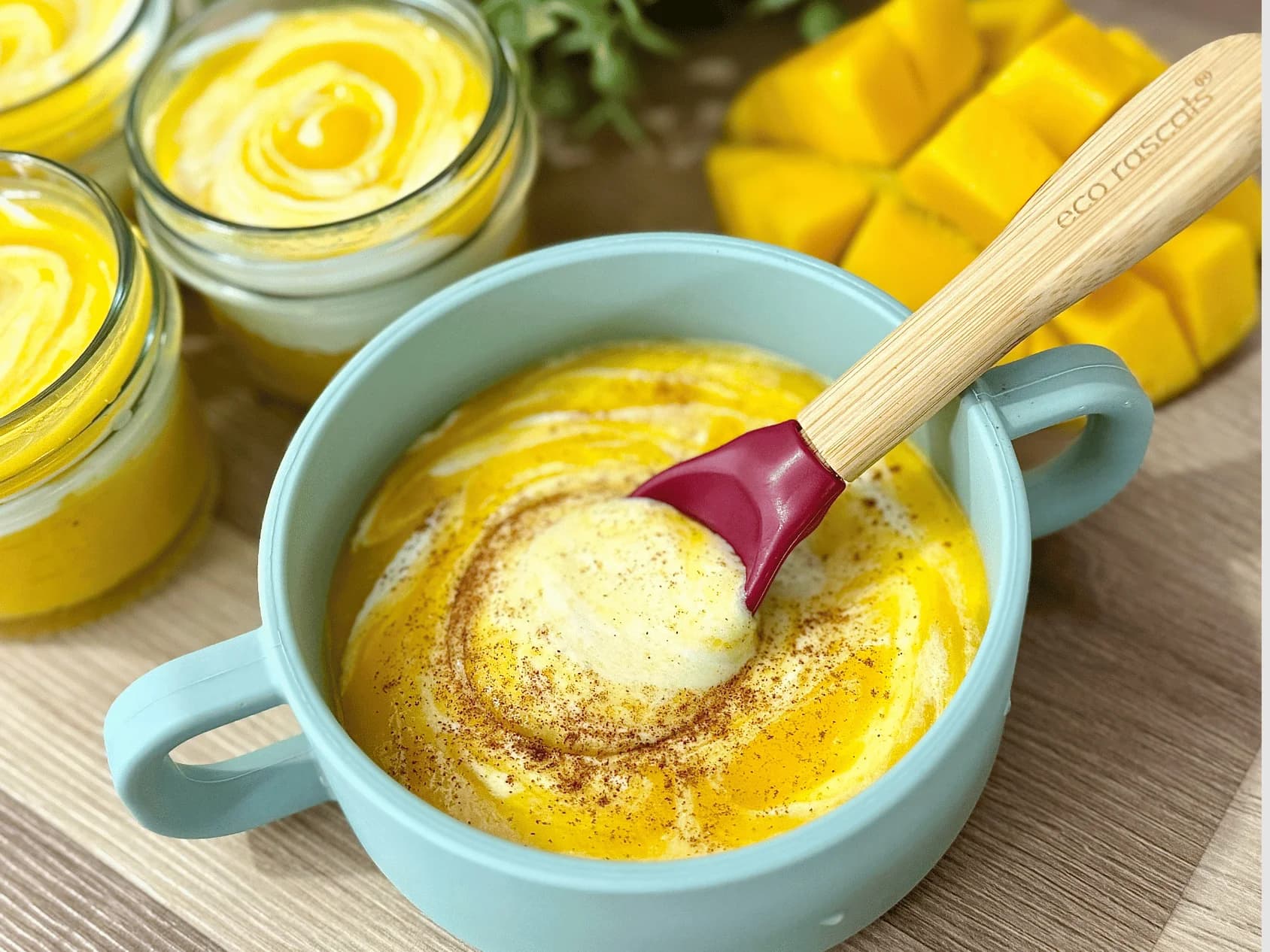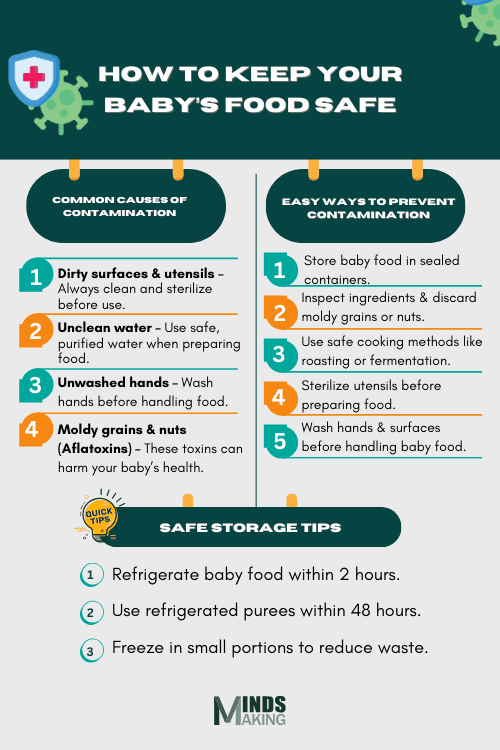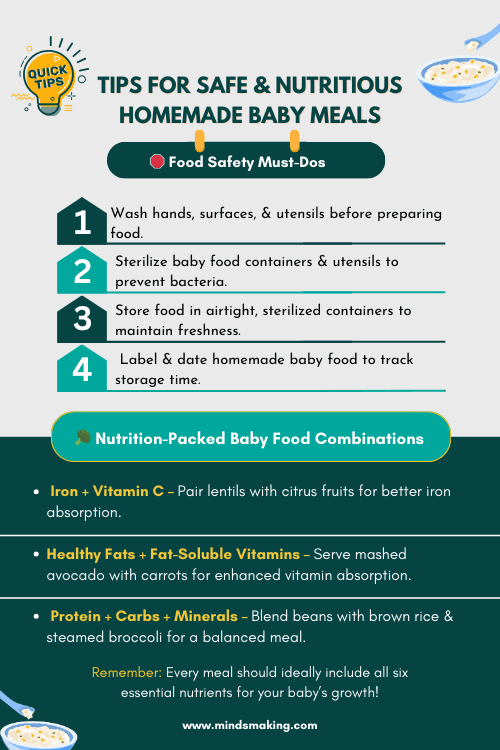Home-made Baby Food Quality Assessment
Mindsmaking

Written by Mindsmaking Medical Writer
Fact Checked by Mindsmaking Professionals
18th, November, 2025
Before you begin your weaning process, there are home-made baby food quality assessment practices you should know for balanced infant nutrition.
A 2025 quality assessment of homemade baby foods and their impact on infant health emphasized that some homemade baby foods often lack essential vitamins and minerals. (6)
Combined with improper preparation and storage, this increases the risk of bacterial growth, leading to contamination and nutritional deficiencies in infants.
These concerns highlight the need for parents like you to study homemade baby food quality assessment, such as best practices and guidelines based on expert recommendations, to ensure the safety and quality of your baby’s meals.
With the right knowledge and food handling techniques, you can minimize risks and provide your babies with nutritious and safe meals.
Key Takeaways
With Home-made baby foods, you can control what goes into your baby's meals and reduce the occurrence of Mycotoxins like Aflatoxins.
The Early Introduction of solid foods before six months, as observed in some practices, can lead to health issues like allergies, diarrhoea, and malnutrition.
Not all home-made baby foods meet international nutritional standards of containing the 6 food classes. Parents should ensure home-made baby foods contain vitamins, minerals, proteins, carbohydrates, fat and oils, and water.
Cooking methods like steaming preserve more nutrients in your baby’s food compared to methods like frying and boiling.
Improper handling and storage of home-made baby foods can lead to baby food contamination. Practicing good hygiene, like handling food with clean hands and properly storing meals in sterilised containers, is important to avoid the introduction of bacteria.
Pairing and incorporating nutrient-rich meals together make for a balanced meal for your baby.
Understanding Home-made Baby Food Trends
You might be wondering how home-made baby food trends came about. It stemmed from growing concerns of mothers like you who were curious about weaning food safety and wanted to quit the processed, store-bought baby foods that contained additives for a more nutritious and healthy alternative.
In this study, it was discovered that microbes like Aflatoxin can occur in both store-bought baby foods like cereal-based foods and home-made baby foods due to the sanitary condition of the preparation processes (9). WHO has identified this as the leading cause of foodborne diseases and mortality in infants (12) . This is why it’s safer to go for home-made baby foods where you have control over what goes into your baby's system.
Some common types of home-made baby foods include grains like cornmeal, porridge, rice, and oatmeal. Mashed or pureed fruits like bananas, strawberries, avocados and grapes. Veggies like carrots, broccoli, and sweet potatoes. And finally, lean proteins like beans, eggs, and meats. These are all organic and healthy foods that are beneficial for infant nutrition.
Why some parents choose home-made baby foods over store-bought processed foods for various reasons, such as:
Control over ingredients: Homemade baby foods give parents the ability to avoid preservatives, added sugars, and artificial flavors, ensuring that infants are only getting natural, wholesome ingredients.
This is important to infant nutrition because the majority of store-bought baby foods contain toxins that are carcinogenic and a leading cause of various liver cancers. (8)
Cost-effectiveness: Store-bought baby foods can be more expensive compared to making your baby’s food at home, especially when those commercial foods are imported from different countries. You can save money on baby food by making nutritious meals from the whole foods you buy during grocery shopping.
Customizability: You can adjust home-made baby food textures and flavors to your baby's needs without compromising on the nutritional value, unlike processed baby foods, as they usually come with a given measurement.
Cultural and Economic Influences: Many cultures have traditional weaning foods that families pass down through generations. For example, some African cultures usually introduce home-made baby meals made from ground corn and grains from 6 months.
When To Introduce Weaning Foods
The World Health Organisation (WHO) recommends exclusive breastfeeding for the first six months, followed by the gradual introduction of solid foods while continuing breastfeeding for up to two years or longer. (5)
The study found that some caregivers introduced solid foods to infants as early as two to three months old, thereby increasing the risks of nutritional deficiencies in infants.
Additionally, it stated that incorrect preparation methods, such as adding too much water to purees, can dilute essential nutrients, further contributing to nutritional deficiencies in infants.
Early weaning has been linked to issues like:
- Increased risk of diarrhoea and infections. (1)
- Poor digestion due to immature digestive enzymes.
- Higher chances of developing food allergies.(7)
Infants should only be introduced to complementary foods at 6 months (180 days) while continuing to breastfeed or formula feed [11]. So, the standard weaning practice is that your infant should not begin taking any extra solids from 0 - 5 months.
Nutritional composition of home-made baby foods
In infant nutrition, healthy and balanced home-made baby food should consist of vital nutrients like vitamins and proteins. This is because the macronutrient content of home-made baby foods is crucial in child development.
The study revealed that many meals used as samples for the home-made baby food quality assessment lacked adequate nutrients like protein, iron, and essential vitamins. It was either too high or too low in certain nutrients. It also showed that a number of infectious diseases occurring in infants were linked to undernutrition. (7)
International nutritional standards recommend that meals should contain all six classes of foods for maximum nutrition. However, some home-made meals fall short when compared to international nutritional standards because they do not contain all the needed nutrients.
When preparing home-made baby food for your child, you should ensure that it contains:
- Proteins like eggs, milk, yoghurt, beans, or meats,
- Carbohydrates like rice and potatoes
- Fats and Oils like avocado, coconut milk or oil, and nuts.
- Vitamins - bell peppers, broccoli, fruits and spinach.
- Minerals such as nuts and shellfish.
- Water
The Impact of different cooking methods on nutrient retention and best practices
From the quality assessment, it was discovered that the cooking methods significantly affected nutrient retention in some of the home-made baby foods (7). There are certain cooking processes that are ideal for certain foods because they don't completely strip the foods of their nutrients.
For instance, boiling vegetables can lead to the loss of water-soluble vitamins and minerals, while steaming preserves more of those nutrients. But boiling tough foods like rice and beans would be an effective cooking method for infants.
To maximize the nutritional value of tender foods, it's advisable to use methods like steaming or microwaving with minimal water. Additionally, cooking foods until just tender and avoiding high temperatures can help retain essential nutrients either by roasting, boiling, or steaming.
Read This Next
No posts available
How to prevent baby food contamination
Baby food contamination is a significant concern when it comes to home-made baby foods. The study showed the growth of microorganisms in some home-prepared foods due to unsanitary preparation, indicating potential health risks. Some common sources of contamination are:
- Using unsanitary surfaces and unsterilised utensils when preparing baby food.
- Incorporating contaminated water when preparing baby foods.
- Handling baby food with unwashed hands.
A popular form of microbes introduced into baby meals is Aflatoxins. This toxin compound is produced by certain molds that develop in improperly stored grains and nuts, and exposure to aflatoxins in infancy has been linked to variations of liver cancers and infant malnutrition.
Study shows that because of their toxic, carcinogenic, mutagenic, teratogenic, and immunotoxic properties, Aflatoxins are classified as group 1 carcinogens by the IARC (9). You can avoid the growth of this deadly toxin with these prevention tips:
- Store baby foods in a sealed container.
- Avoid purchasing moldy or discolored grains for your baby.
- Sort and inspect ingredients, discarding any that look moldy or discolored.
- Consider alternative cooking methods, such as fermentation or roasting, which may help reduce aflatoxin levels.
- Sterilize your containers and utensils.
- Wash your hands and surfaces before handling your baby’s meals
To avoid baby food contamination or microbial growth of deadly toxins, even after observing these tips, you should also be cautious of the storage duration of your home-made baby food. Keeping prepared foods at appropriate temperatures and consuming them within recommended time frames can minimize microbial growth and ensure food safety. (10)
Recommended procedures to prevent home-made baby food health risks include:
- Refrigerate homemade baby foods within two hours of preparation.
- Avoid keeping pureed baby foods in the fridge for more than 48 hours to prevent bacterial growth.
- Freeze baby food in small portions to reduce waste and prevent contamination]. (2)
Mindsmaking

Tips for Better Nutrition and Safety When Preparing Your Baby’s Meals
The study showed that incorrect preparation methods of food samples collected during the home-made baby food quality assessment led to baby food contamination, which is a leading cause of nutritional deficiencies in infants. (7)
Ensuring the safety and adequate nutrition of home-made baby foods requires adhering to certain guidelines of proper preparation and hygiene. These guidelines include:
- Wash your hands, surfaces, and utensils thoroughly before handling your baby’s food.
- Sterilizing baby food containers and utensils before use reduces the introduction of bacteria.
- Store your home-made baby foods in airtight and sterilised containers.
- Write down the label and date stored on Home-made foods to keep track of freshness.
Public Health Bodies recommend that it is best to incorporate nutrient-rich baby food combinations when making home-made baby foods, as the majority don’t contain all the needed nutrients for dietary balance (7). Nutrient-rich food combinations like:
- Mineral + Vitamins: Pair iron-rich foods like lentils with citrus fruits to enhance absorption.
- Healthy Fats + Fat-Soluble Vitamins: Serve mashed avocado with carrots to aid vitamin absorption.
- Protein + carbohydrate + minerals. Blend beans with brown rice and a side of steamed broccoli for a balanced meal.
Ideally, all your baby's meals should contain the six classes of foods.
Homemade baby food can be a perfect choice when prepared and stored correctly.
This study shows how important it is to educate yourself on home-made baby food quality assessment practices. Observing the guidelines and practices safeguards your child from possible nutritional deficiencies and the risks of baby food contamination.
Safe practices make home-made meals both safe and nutritious for your baby.
Mindsmaking

Was this article helpful?
How many stars are you giving this article?
Leave a comment
Your email address will not be published.